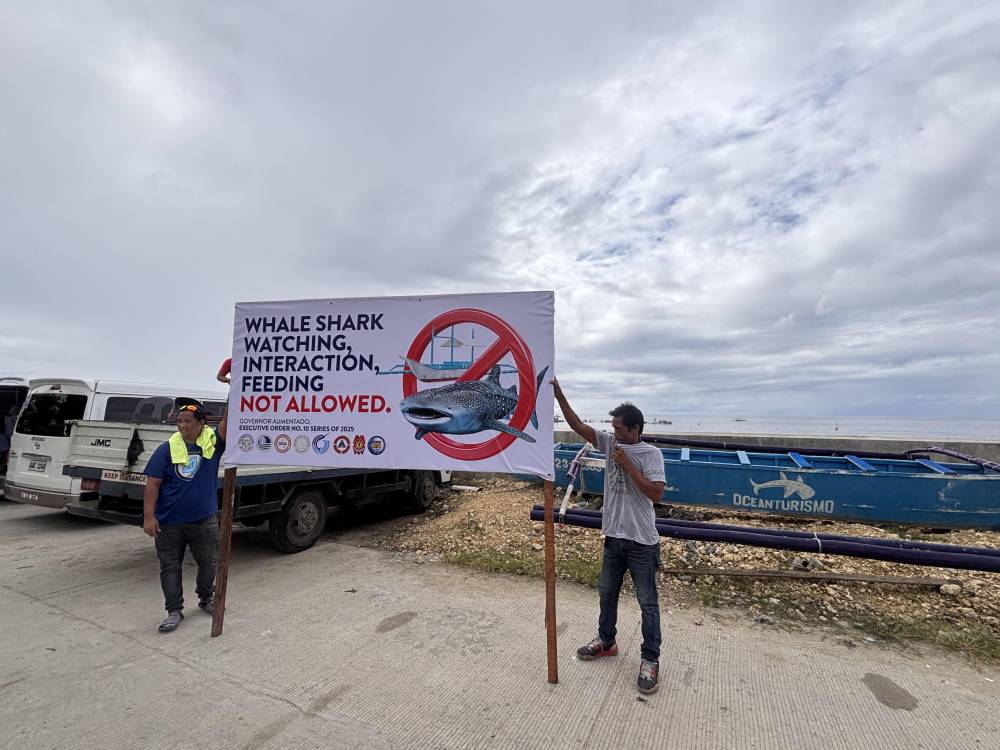Whale shark tours end in Bohol

TAGBILARAN CITY—The provincial government of Bohol formally closed all whale shark activities in the province starting on Friday.
Bohol Gov. Erico Aristotle Aumentado said the ban on whale shark interactions would be in effect starting on Feb. 7 until regulatory requirements were met and verified by concerned government agencies, in consultation with stakeholders and conservation groups.
Aumentado said the practice of feeding the whale sharks with krill (uyap) threatened Bohol Island’s ecology and would affect the migratory sea creature’s natural behavior to transfer from one place to another.
He also cited the foul odor in waters where the whale sharks, locally called “balilan,” have made their habitat.
This, he said, might reach the beaches of Panglao Island and the surrounding waters of Balicasag Island, whose waters are contiguous with the municipalities where whale shark interactions were being done as a tourism come on.
“We only have one home. That’s why we need to protect it,” the governor said.
On Friday, signage were prominently visible in the jump off areas where whale shark activities were conducted in the towns of Lila, Alburquerque and Dauis to inform the public, especially tourists, about Aumentado’s order.
“Whale shark watching, feeding not allowed,” a signage read.
The Philippine National Police, Philippine Coast Guard, Department of Environment and Natural Resources (DENR), and Bohol Provincial Environment and Management Office were tasked to monitor the closure order.
However, the Lila Whale Sharks Watching and Snorkeling operated by Island Wonders Ocean and Nature Park was allowed to operate on Friday, as it had to accommodate the tour of least 200 tourists who booked their trip last month.
Displaced workers
About 300 employees and guides were affected by Aumentado’s order to stop whale shark interactions in the province.
According to the operators, they would comply with the requirements so they would be able to open again in the future.
Whale shark watching in Bohol was pioneered by the municipality of Lila in 2019, when around 10 t0 15 whale sharks having made its waters their habitat. The activity later expanded to Alburquerque and Dauis.
Whale sharks first appeared in the waters of Bohol sometime in the 1980s, with numbers reaching about 50 whale sharks between the 1980s and the 1990s.
At present, there are still between five to six whale sharks in the waters off Lila; five to seven in Alburquerque; and three to five in Dauis.
‘Ecological trap’
Environmental groups and civil society organizations condemned the feeding of whale sharks, calling it an “ecological trap.”
A task force was created last year to conduct an investigation on all whale shark activities, including the feeding of these sea creatures.
It found out that the operators lacked permits from essential government agencies, including the DENR and the Bureau of Internal Revenue.
This led to Aumentado’s issuance of Executive Order No. 10, which ordered the immediate stoppage of all whale shark interactions in Bohol last Feb. 3.
Provincial Board (PB) Member Lucille Lagunay emphasized the importance of regulating tourism, particularly in the Bohol Sea, which serves as a migratory corridor for marine wildlife.
Lagunay clarified that under Provincial Ordinance 2020-008 or the “Sustainable Marine Wildlife Ordinance,” marine wildlife interactions are not prohibited. However, certain activities are restricted to protect the species and their habitat.
The Provincial Board, through its committee on environment and natural resources, had conducted an investigation into reports of whale shark feeding in the province.
PB Member Jamie Aumentado-Villamor said an interagency consulting team was formed to assess whether regulations were being followed.
“We are concerned about people’s livelihood, but we also need to ensure sustainability,” she said.
The Free The Whale Sharks Coalition-Bohol (FTWSCB), which has opposed the proliferation of whale interactions in Bohol, said they were pleased that concerned operators complied with the cessation order.
“We hope that the task force will promptly initiate the necessary next steps, including consultations and debriefings with key stakeholders and the community, additional awareness-raising activities on sustainable marine wildlife tourism, and support for affected livelihoods, ” said Architect Liza Macalandag, one of the convenors of FTWSCB.
The Bohol Sea represents a biodiversity hotspot for cetaceans in the Philippines, and SouthEast Asia.
Whale sharks (Rhincodon typus) are protected marine animals governed by local and international protection laws. They are listed in both the Convention on International Trade in Endangered Species of Wild Flora and Fauna under Appendix II and the Convention of Migratory Species of Wild Animals.

















